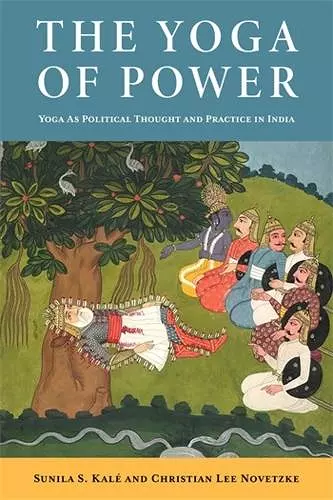The Yoga of Power
Yoga as Political Thought and Practice in India
Christian Lee Novetzke author Sunila Kalé author
Format:Paperback
Publisher:Columbia University Press
Published:10th Dec '24
£30.00
Supplier delay - available to order, but may take longer than usual.

In Indian languages from Sanskrit to Marathi, yoga has an enormous range of meanings, though most often it refers to philosophy or methods to control the mind and body. This book argues for a wider understanding, demonstrating that yoga has long expressed political thought and practice. The political idea of yoga names the tools of kings, poets, warriors, and revolutionaries. It encodes stratagems for going into battle and for the demands of governance. This idea suggests routes to self-rule even when faced with implacable obstacles, and it defines righteous action amid the grime and grief of politics and war.
Sunila S. Kalé and Christian Lee Novetzke chart a new genealogy of yoga, beginning with uses of the term in the Ṛg Veda, the Mahābhārata, the Bhagavad Gītā, and the Arthaśāstra. In the world of these texts, yoga names everything from war and battle strategy to good governance, espionage, taxation, and welfare. Kalé and Novetzke follow this trail into the modern period, examining the writings and speeches of thinkers such as Gandhi, Tilak, Aurobindo, and Ambedkar as well as the extraordinary story of the Princely State of Aundh, whose ruler saw the Surya Namaskar (Sun Salutation) as a tool for sovereignty. Offering a novel interpretation of yoga that embraces its long-standing political conceptualization, this book sheds light on South Asian political thought and history from its earliest texts to the present day.
This brilliant work reveals a new way of understanding yoga that makes sense of a hugely important but hitherto overlooked aspect of its history. It is essential reading for students and scholars of yoga. -- Jim Mallinson, coauthor of Roots of Yoga
Novetzke and Kalé’s combined disciplinary insights—from religious studies and political science—provide something that is extremely rare in the study of Indian politics: a convincing argument for how and why it is critically important to understand political philosophy in a way that engages with modernity but is not defined by the ideological supposition of Enlightenment reasoning. The authors of TheYoga of Power do a masterful job of radically demythologizing yoga. -- Joseph S. Alter, author of Yoga in Modern India: The Body Between Science and Philosophy
The Yoga of Power is a marvelous piece of scholarship that argues that yoga is more than either a school of philosophy or a regime of psychophysical practice, but rather rewrites the history of yoga as an enduring tradition of political thought and practice in India. Combining textual reading, archival work, and ethnographic study, the book intervenes in the disciplines of history and area studies by demonstrating the epistemological gains of breaching the temporal boundaries between the precolonial, the colonial, and the postcolonial, urging us to rethink what we imagine today as politics and the political. -- Prathama Banerjee, author of Elementary Aspects of the Political: Histories from the Global South
ISBN: 9780231220019
Dimensions: unknown
Weight: unknown
272 pages